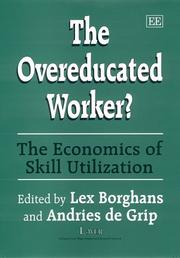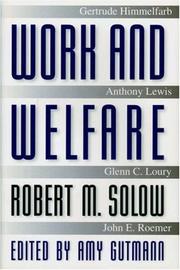| Listing 1 - 4 of 4 |
Sort by
|
Book
ISBN: 9282534618 9789282534618 Year: 1983 Publisher: Berlin European centre for the development of vocational training
Abstract | Keywords | Export | Availability | Bookmark
 Loading...
Loading...Choose an application
- Reference Manager
- EndNote
- RefWorks (Direct export to RefWorks)
Skilled workers --- -Skilled workers --- -Dienstensector 338.46 --- Information technology --- Service industries workers --- Skilled labor --- Dienstensector 338.46 --- Labor --- Service industries --- Employees --- IT (Information technology) --- Technology --- Telematics --- Information superhighway --- Knowledge management --- European Economic Community countries --- Training of --- Bibliography --- Service industries workers - European Economic Community countries - Bibliography --- Information technology - European Economic Community countries --- Skilled workers - European Economic Community countries

ISBN: 184064155X 9781840641554 Year: 2000 Publisher: Cheltenham Elgar.
Abstract | Keywords | Export | Availability | Bookmark
 Loading...
Loading...Choose an application
- Reference Manager
- EndNote
- RefWorks (Direct export to RefWorks)
Underemployment. --- Labor supply --- Unskilled labor --- Sous-emploi --- Marché du travail --- Ouvriers non qualifiés --- Effect of education on. --- Supply and demand. --- Effets de l'éducation sur --- Offre et demande --- Underemployment --- Effect of education on --- Supply and demand --- 331.5 --- Arbeidsmarkt. Werkgelegenheid --(algemeen) --- 331.5 Arbeidsmarkt. Werkgelegenheid --(algemeen) --- Marché du travail --- Ouvriers non qualifiés --- Effets de l'éducation sur --- Laborers --- Low-skilled labor --- Low-skilled workers --- Labor --- Unemployment --- Education and employment --- Employment and education --- Education --- Labor supply - Effect of education on --- Unskilled labor - Supply and demand
Book
ISBN: 9289601043 9789289601047 Year: 2002 Volume: 33 Publisher: Luxembourg Office for official publications of the European communities
Abstract | Keywords | Export | Availability | Bookmark
 Loading...
Loading...Choose an application
- Reference Manager
- EndNote
- RefWorks (Direct export to RefWorks)
Labour market --- Adult education. Lifelong learning --- European Union --- Occupational training --- Unskilled labor --- Labor market --- Manpower policy --- Formation professionnelle --- Ouvriers non qualifiés --- Marché du travail --- Emploi --- Case studies. --- Cas, Etudes de --- Politique gouvernementale --- Employees --- Training of --- -Labor market --- -Manpower policy --- -Occupational training --- -Unskilled labor --- -#SBIB:316.334.2A344 --- #SBIB:316.334.1O243 --- #SBIB:316.334.1O350 --- #A0211A --- 713 Beroepsopleiding en beroepsomscholing --- Laborers --- Low-skilled labor --- Low-skilled workers --- Labor --- Job training --- Manpower development and training --- Manpower training programs --- Vocational training --- Education --- Training --- Education and training services industry --- Practice firms --- Employment policy --- Human resource development --- Labor market policy --- Manpower utilization --- Labor policy --- Labor supply --- Trade adjustment assistance --- Market, Labor --- Supply and demand for labor --- Markets --- Personnel --- Workers --- Persons --- Industrial relations --- Personnel management --- -Arbeidssociologie: ongelijkheden op de arbeidsmarkt: positie van ongeschoolden op de arbeidsmarkt --- Onderwijsorganisatie: volwassenenvorming --- Onderwijs en economie --- Government policy --- Supply and demand --- Ouvriers non qualifiés --- Marché du travail --- #SBIB:316.334.2A344 --- Arbeidssociologie: ongelijkheden op de arbeidsmarkt: positie van ongeschoolden op de arbeidsmarkt --- Unskilled labor - European Union countries --- Occupational training - European Union countries --- Employees - Training of - European Union countries --- Labor market - European Union countries --- Manpower policy - European Union countries --- POLITIQUE DE L'EMPLOI --- EUROPE

ISBN: 0691058830 9786612458231 1400822645 128245823X 1400807557 9780691058832 Year: 1998 Publisher: Princeton Princeton university press
Abstract | Keywords | Export | Availability | Bookmark
 Loading...
Loading...Choose an application
- Reference Manager
- EndNote
- RefWorks (Direct export to RefWorks)
The Nobel Prize-winning economist Robert Solow directs his attention here to one of today's most controversial social issues: how to get people off welfare and into jobs. With characteristic eloquence, wit, and rigor, Solow condemns the welfare reforms recently passed by Congress and President Clinton for confronting welfare recipients with an unworkable choice--finding work in the current labor market or losing benefits. He argues that the only practical and fair way to move recipients to work is, in contrast, through an ambitious plan to guarantee that every able-bodied citizen has access to a job. Solow contends that the demand implicit in the 1996 Welfare Reform Act for welfare recipients to find work in the existing labor market has two crucial flaws. First, the labor market would not easily make room for a huge influx of unskilled, inexperienced workers. Second, the normal market adjustment to that influx would drive down earnings for those already in low-wage jobs. Solow concludes that it is legitimate to want welfare recipients to work, but not to want them to live at a miserable standard or to benefit at the expense of the working poor, especially since children are often the first to suffer. Instead, he writes, we should create new demand for unskilled labor through public-service employment and incentives to the private sector--in effect, fair "workfare." Solow presents widely ignored evidence that recipients themselves would welcome the chance to work. But he also points out that practical, morally defensible workfare would be extremely expensive--a problem that politicians who support the idea blithely fail to admit. Throughout, Solow places debate over welfare reform in the context of a struggle to balance competing social values, in particular self-reliance and altruism. The book originated in Solow's 1997 Tanner Lectures on Human Values at Princeton University. It includes reactions from the distinguished scholars Gertrude Himmelfarb, Anthony Lewis, Glenn Loury, and John Roemer, who expand on and take issue with Solow's arguments. Work and Welfare is a powerful contribution to debate about welfare reform and a penetrating look at the values that shape its course.
Income --- United States --- Public welfare --- Welfare recipients --- Poor --- Unskilled labor --- Wages --- Employment --- 336.1 <73> --- 330.1 --- 331.526 --- -Welfare recipients --- -Poor --- -Unskilled labor --- -Wages --- -#SBIB:316.334.2A470 --- #SBIB:316.8H40 --- US / United States of America - USA - Verenigde Staten - Etats Unis --- 331.31 --- 332.691 --- 330.580 --- 339.21 --- 332.630 --- Compensation --- Departmental salaries --- Earnings --- Pay --- Remuneration --- Salaries --- Wage-fund --- Wage rates --- Working class --- Labor costs --- Compensation management --- Cost and standard of living --- Prices --- Laborers --- Low-skilled labor --- Low-skilled workers --- Labor --- Disadvantaged, Economically --- Economically disadvantaged --- Impoverished people --- Low-income people --- Pauperism --- Poor, The --- Poor people --- Persons --- Social classes --- Poverty --- Public welfare recipients --- Benevolent institutions --- Poor relief --- Public assistance --- Public charities --- Public relief --- Public welfare reform --- Relief (Aid) --- Social welfare --- Welfare (Public assistance) --- Welfare reform --- Human services --- Social service --- Public finance, government finance in general--Verenigde Staten van Amerika. VSA. USA --- Economische grondbegrippen. Algemene begrippen in de economie --- Levels of employment. Employment situation, conditions --- -Employment --- -Arbeidssociologie: het sociaal-economisch overheidsbeleid: algemeen --- Sociaal beleid: social policy, sociale zekerheid, verzorgingsstaat --- Economisch beleid. --- Evolutie van de arbeidsmarkt. --- Gecontroleerde economie. Geleide economie. Welvaarststaat. Algemeenheden. --- Ongelijkheid en herverdeling van vermogens en inkomens. Inkomensbeleid. --- Strijd tegen de werkloosheid: algemeen. Theorie en beleid van de werkgelegenheid. Volledige werkgelegenheid. --- Economic conditions --- Government policy --- 331.526 Levels of employment. Employment situation, conditions --- 330.1 Economische grondbegrippen. Algemene begrippen in de economie --- 336.1 <73> Public finance, government finance in general--Verenigde Staten van Amerika. VSA. USA --- #SBIB:316.334.2A470 --- Arbeidssociologie: het sociaal-economisch overheidsbeleid: algemeen --- Gecontroleerde economie. Geleide economie. Welvaarststaat. Algemeenheden --- Economisch beleid --- Strijd tegen de werkloosheid: algemeen. Theorie en beleid van de werkgelegenheid. Volledige werkgelegenheid --- Evolutie van de arbeidsmarkt --- Ongelijkheid en herverdeling van vermogens en inkomens. Inkomensbeleid --- Public welfare - United States --- Welfare recipients - Employment - United States --- Poor - Employment - United States --- Unskilled labor - United States --- Wages - United States --- United States of America
| Listing 1 - 4 of 4 |
Sort by
|

 Search
Search Feedback
Feedback About UniCat
About UniCat  Help
Help News
News